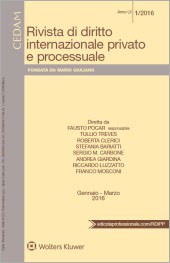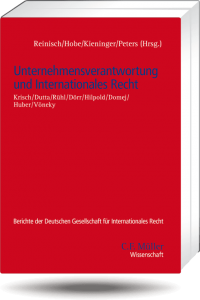Private International Law Aspects of Corporate Social Responsibility Ius Comparatum – Global Studies in Comparative Law – Volume 42
A new volume in the series of Ius Comparatum – Global Studies in Comparative Law has been recently published by Springer. The volume was edited by Prof. Catherine Kessedjian, Université Panthéon-Assas Paris II Paris, France, and Prof. Humberto Cantú Rivera, School of Law University of Monterrey, Mexico.
The book addresses one of the core challenges in the corporate social responsibility (or business and human rights) debate: how to ensure adequate access to remedy for victims of corporate abuses that infringe upon their human rights. However, ensuring access to remedy depends on a series of normative and judicial elements that become highly complex when disputes are transnational. In such cases, courts need to consider and apply different laws that relate to company governance, to determine the competent forum, to define which bodies of law to apply, and to ensure the adequate execution of judgments. The book also discusses how alternative methods of dispute settlement can relate to this topic, and the important role that private international law plays in access to remedy for corporate-related human rights abuses.
This collection comprises 20 national reports from jurisdictions in Europe, North America, Latin America and Asia, addressing the private international law aspects of corporate social responsibility, most of which were prepared for the Fukuoka Conference of the
International Academy of Comparative Law in the summer of 2018. They were last
updated in February 2019 for this publication. The model questionnaires, in French
and English, are included after the national reports.
The book draws two preliminary conclusions: that there is a need for a better understanding of the role that private international law plays in cases involving transnational elements, in order to better design transnational solutions to the issues posed by economic globalisation; and that the treaty negotiations on business and human rights in the United Nations could offer a forum to clarify and unify several of the elements that underpin transnational disputes involving corporate human rights abuses, which could also help to identify and bridge the existing gaps that limit effective access to remedy. Adopting a comparative approach, this book appeals to academics, lawyers, judges and legislators concerned with the issue of access to remedy and reparation for corporate abuses under the prism of private international law.
The list of contributors is the following:
Joost Blom Peter A. Allard School of Law, University of British Columbia, Vancouver, BC, Canada
Angelica Bonfanti Dipartimento di Diritto pubblico italiano e sovranazionale, Università degli Studi di Milano, Milano, Italy
Andrea Bonomi University of Lausanne, Lausanne, Switzerland
Nicolas Bueno University of Zurich, Zürich, Switzerland
Humberto Cantú Rivera School of Law, University of Monterrey, Monterrey, Mexico
Nicolás Carrillo Santarelli Universidad de La Sabana, Bogotá, Colombia
Si Chen Faculty of Law, McGill University, Montreal, QC, Canada
Steven Comerford U.S. State Department, Washington, DC, USA
Juan Ignacio Contardo Universidad Diego Portales, Santiago, Chile
Anne Danis-Fatôme Université de Brest, Brest, France
Mafalda de Sá Faculty of Law, University of Coimbra, Coimbra, Portugal
Marilda Rosado de Sá Ribeiro Universidad do Estado do Rio de Janeiro, Rio de Janeiro, Brazil
Katrin Deckert Université Paris-Nanterre, Paris, France
Siel Demeyere KU Leuven, Leuven, Belgium
Liesbeth F. H. Enneking Erasmus School of Law, Erasmus University Rotterdam, The Netherlands
Monika Feigerlová Institute of State and Law, Czech Academy of Sciences, Prague, Czech Republic
Leonhard Hübner Institut für ausländisches und internationales Privat- und Wirtschaftsrecht, Universität Heidelberg, Heidelberg, Germany
Luca Kaller Max-Planck-Institut für ausländisches und internationales Privatrecht, Hamburg, Germany
Milana Karayanidi Orrick, Herrington & Sutcliffe LLP, Washington, DC, USA
Catherine Kessedjian Université Panthéon-Assas Paris II, Paris, France
William Fernando Martínez Luna Universidad Jorge Tadeo Lozano, Bogotá, Colombia
Kasey McCall-Smith Public International Law, Edinburgh Law School, University of Edinburgh, UK
María Susana Najurieta Universidad de Buenos Aires, Viamonte, Argentina
Chien Quoc Ngo Foreign Trade University, Hanoi, Vietnam
Marie Laure Niboyet Université Paris-Nanterre, Paris, France
Monika Pauknerová Institute of State and Law, Czech Academy of Sciences, Prague, Czech Republic
Rui Pereira Dias Faculty of Law, University of Coimbra, Coimbra, Portugal
Verónica Ruiz Abou-Nigm Edinburgh Law School, University of Edinburgh, UK
Martijn W. Scheltema Erasmus School of Law, Erasmus University Rotterdam, The Netherlands
Judith Schönsteiner Universidad Diego Portales, Santiago, Chile
Inês Serrano de Matos Faculty of Law, University of Coimbra, Coimbra, Portugal
Laurence Sinopoli Université Paris-Nanterre, Paris, France
Zeynep Derya Tarman Department of Private International Law, Koc University Law School, Istanbul, Turkey
Hien Thi Tran CSR Research Group, Foreign Trade University, Hanoi, Vietnam
Guangjian Tu Faculty of Law (FLL), University of Macau, Taipa, Macau, China
Geert Van Calster Department of International and European Law, KU Leuven, Leuven, Belgium
Florencia S. Wegher Osci Escuela de Ciencias Jurídicas y Sociales, Universidad Nacional del Litoral, Santa Fe, Argentina
Marc-Philippe Weller Institut für ausländisches und internationales Privat- und Wirtschaftsrecht, Universität Heidelberg, Heidelberg, Germany
Dai Yokomizo Nagoya University, Nagoya, Japan
More information about this series may be found here.


 The first issue of 2020 of the
The first issue of 2020 of the  In April 2019 the
In April 2019 the